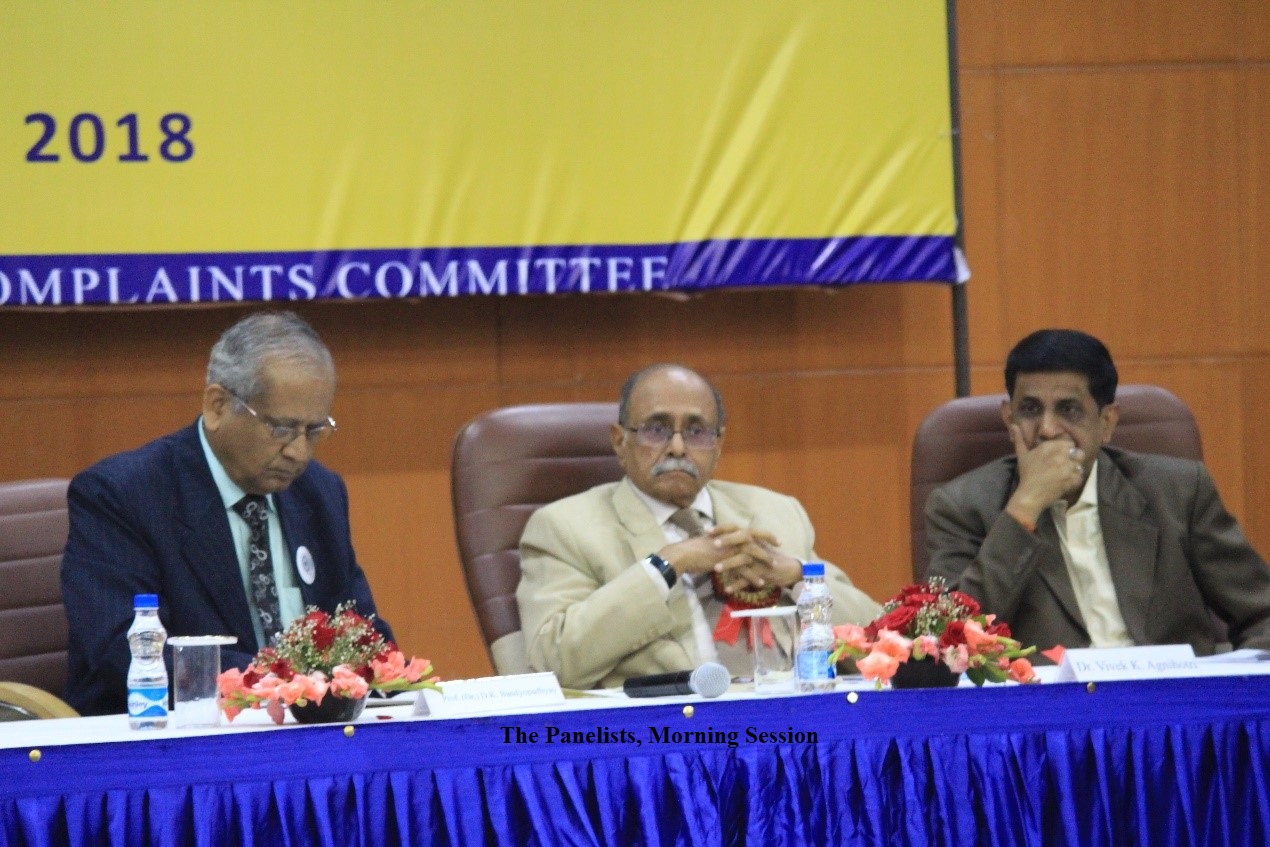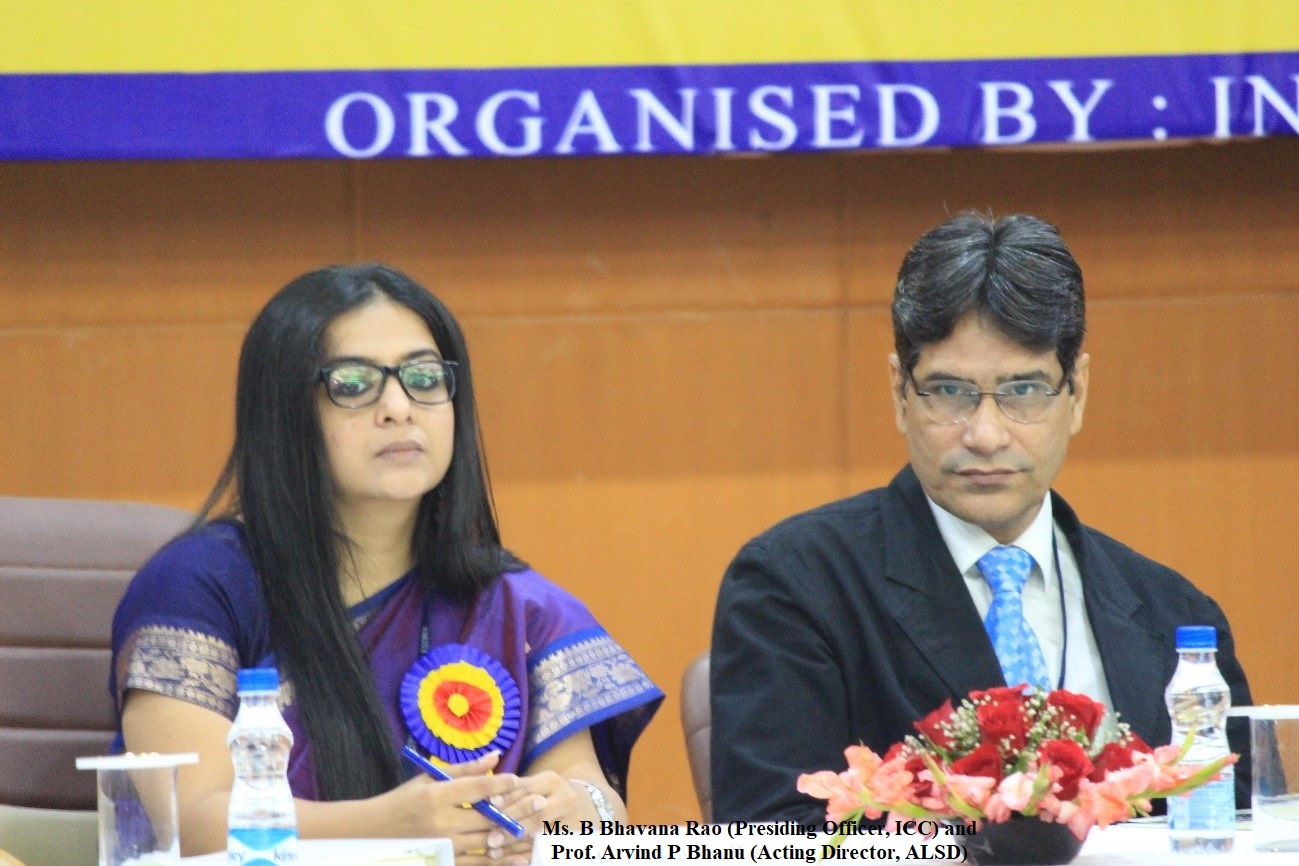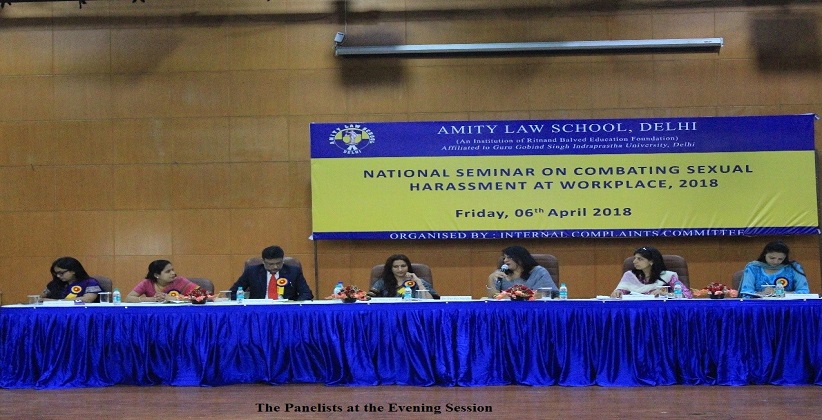The Internal Complaints Committee (ICC) of Amity Law School, Delhi affiliated by Guru Gobind Singh Indraprastha University organized a National Seminar on 'Combating Sexual Harassment at Workplace' on April 06, 2018. The core concept of the seminar was highlighting the essence and role of ICC (Internal Complaints Committee) in providing protection and safe environment to women from sexual harassment at workplaces and educational institutions.
The Internal Complaints Committee (ICC) which derives statutory mandate from the Sexual Harassment of Women at Workplace Act, 2013 is committed to creating and maintaining an environment which is free from all forms of gender violence, sexual harassment, and discrimination on the basis of sex or gender.
The seminar brought together academicians, researchers, students, HR executives, social activists, law enforcers and representatives of the civil society to engage with problems pertaining to ethical conduct at workplaces and institutions, in light of sexual harassment. It is an attempt at creating awareness about the legal remedies available and the various ways that may be undertaken to combat unwelcome conduct.
The seminar flagged off with the presence of Dr. Vivek Kumar Agnihotri, Former Secretary General of Rajya Sabha and the Chief Guest of the opening session who addressed the gathering and handed over the dais to the Guest of Honour, Prof. (Dr.) Manoj Kumar Sinha, Director of Indian Law Institute (ILI) who stressed on the fact that no woman should ever supposed to bow down to any sort of pressure at all.

The Panelists, Morning Session
The first session began with eminent panelists over the theme of Sexual Harassment at Workplace- A gender issue in which exceptional speeches were delivered by Ms. Shilpa Roy, Deputy Secretary, Ministry of Women and Child Development, Ms. Anju Pandey, regular speaker on women empowerment and Ms. Kuljit Kaur, Secretary, All India Women's Conference. They reflected grave concern that the process of complaint in sexual harassment cases at the workplace is very difficult and that 74% of the aggrieved do not know how and where to complain. Ms. Meghna Nimbekar, student of Amity Law School, Delhi on being asked about the process of filing a complaint has said that The setting up of a Local Complaints Committee (LCC) and the District Officer, by and large help the Internal Complaints Committee (ICC) and become an aid to the path of a just environment. A limitation period of 3 months is to be taken into account by the ICC or the LCC, and then only an inquiry would be held within 90 days. Thereafter, a report is submitted to the employer. This gives effect to a further set of duties for the employer.
Raising the concern, the panel even requested the Internal Complaints Committee (ICC) to find an appropriate solution to the problem. They also put stress that ICC should organize such programs on a regular basis for better results. Ms. Kaur said that "Your workplace should be safe, happy and comfortable as you spend most of your time there rather than at home."

Ms. B Bhavana Rao (Presiding Officer, ICC) and Prof. Arvind P Bhanu (Acting Director, ALSD)
Being a government representative, Ms. Roy mentioned that the government is conducting a lot of awareness programs and workshops to create awareness about women safety at the workplace. She said that "SHe BOX is created for women safety and support in which 112 organizations are empanelled." The Sexual Harassment electronic Box (SHe Box) is an effort of Government of India to provide a single window access to every woman to register their complaint related to sexual harassment at the workplace. The LawStreet Journal staff reporter when further raised the question on the government responsibilities Ms. B. Bhavana Rao, Presiding Officer of ICC replied that "The government should keep a check on compliance with the legislation. But the corporates and institutions should contribute equally."
The second session brought out some more vibrant panelists namely, Dr. Jyoti Dogra Sood, Dr. Devika Narula, Ms. Pallavi Pareek, Senior advocate Diljit Singh Ahluwalia and Ms. Sheyla Rashid Shora, a social activist who threw more light on the gaps between organizational practices and prevalence/frequency of sexual harassment at workplace.
The panel discussed that ICC has come into existence so that even a junior can raise his/her voice against sexual harassment against the senior which earlier went futile and ineffective. Advocate Ahluwalia shared a shocking fact that as contrary to India and other countries, Kazakhstan is the only country where a higher percentage of eve teasing cases are registered by men against women.
Ms. Rashid delivering a fascinating speech stated that "the aim is not to send men behind bars or to get them punished in any other way, but it is to make women feel safe and not feel excluded from the society. All of us are a product of our culture and not only men, but the women also have to take the responsibility. It is only through this collective effort that the society will, by and large, be moving towards gender sensitization.
Moreover, Ms. Rashid raising the subject of gender sensitization had also talked about GSCASH, i.e., Gender Sensitization and Committee against Sexual Harassment and said that the media could be an active pillar to bring gender sensitization.
Further, the panel also highlighted the fact that even men can be the victims of sexual harassment at workplace and that they should not feel shy to talk about the issue. Again, the media could be an aid to break this social stigma.
The panel also initiated talks on the huge pay gaps between men and women in which a statistical study was emphasized in which it was showed that only 8 percent of the women are present in the dictatorial roles in the companies. Ms. B. Bhavana Rao, on being asked by our staff reporter about the reasonable steps that could be taken to address the issue has said that Individual organizations should begin by improving the ratio of women to men during the recruitment process so that workplaces look more secure, and by also creating a culture of compliance. The ICC of an organization should not be appointed by the same people (management) who could be possible perpetrators in the future.
The final session saw the presence of the Chief Guest, Senior Advocate of Supreme Court Mr. K.T.S Tulsi who explained the state of events from the angle of a criminal lawyer in tackling the sexual harassment cases.
The daylong seminar ended by Prof. (Dr.) B.K Bandhyopadhyay, chairman of Amity Law School, congratulating the Committee for organizing the event with success.
The LawStreet Journal to gather more information on the subject has asked several questions at the end of the event: On being asked what are the duties of the employer in concern of sexual harassment at workplace Ms. Meghna Nimbekar said that the primary duty of the employer is to see that there is an ICC in existence. However, this is only a baby step in the long process of looking after the situation. The ICC must not be outdated in the sense that it is not in compliance with the present legal policies and the frequent up gradation of employer-employee contracts.
Another student of the Amity Law School Mr. Utsav on being asked about the provisions and preventive steps in the law regarding sexual harassment at workplace has said that The Sexual Harassment of Woman at Workplace Act 2013 and the Indian Penal Code deal with sexual harassment on their own level. The specific legislation being the 2013 Act. The preventive measures are established in the law but are few and far between. Gender sensitization councils are to be set up under the law, but very few institutions actually have established cells. The ICC comes into action only upon the occurrence of an act of harassment, and therefore is only positive in nature.
Presently, the workplace culture in India is evolving very fast, and in order to combat the problem of sexual harassment at workplace, it is very crucial to understand what amounts to sexual harassment as well as redressals available under the law to deal with the issue. The seminar organized by the Amity Law School, Delhi was a big step towards creating awareness about the above issue.
To help companies with compliances regarding sexual harassment at workplace.
To download your own Sexual Harassment premium kit









